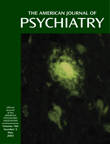Self-Help for Bulimia Nervosa: A Randomized Controlled Trial
Abstract
OBJECTIVE: The authors examined the effectiveness of unguided self-help as a first step in the treatment of bulimia nervosa. METHOD: A total of 85 women with bulimia nervosa who were on a waiting list for treatment at a hospital-based clinic participated. The patients were randomly assigned to receive one of two self-help manuals or to a waiting list control condition for 8 weeks. One of the self-help manuals addressed the specific symptoms of bulimia nervosa (cognitive behavior self-help), while the other focused on self-assertion skills (nonspecific self-help). RESULTS: Twenty patients (23.5%) dropped out of the study. The data were analyzed with intention-to-treat analysis. Although the group-by-time interaction for binge eating and purging was not statistically significant, simple effects showed that there was a significant reduction in symptom frequency in both self-help conditions at posttreatment but not in the waiting list condition. There were no statistically significant changes in levels of dietary restraint, eating concerns, concerns about shape and weight, or general psychopathology. A greater proportion of patients in the cognitive behavior self-help (53.6%) and nonspecific self-help (50.0%) conditions reported at least a 50% reduction in binge eating or purging at posttreatment, compared with the waiting list condition (31.0%). A lower baseline knowledge about eating disorders, more problems with intimacy, and higher compulsivity scores predicted a better response. CONCLUSIONS: The findings suggest that a subgroup of patients with bulimia nervosa may benefit from unguided self-help as a first step in their treatment. Cognitive behavior self-help and nonspecific self-help had equivalent effects.



